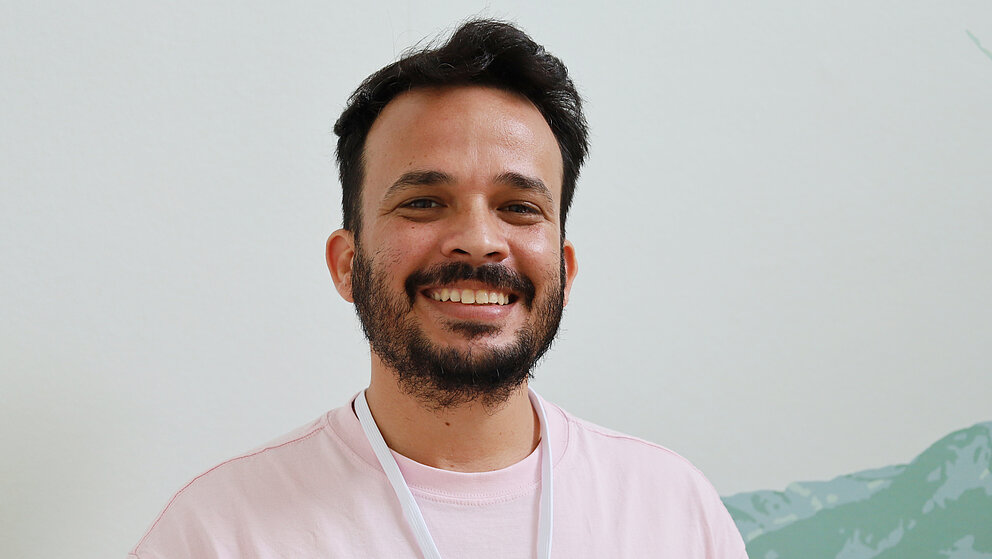
Just how his fascination with biology emerged over 25 years ago is something the Cuban scientist and Humboldtian Yander Luis Diez García still remembers. “It was in my hometown of Banes, sitting watching the television in my parent’s living room.” Moderating the programme, “Entorno” every Monday at 8.30 in the evening, the environmentalist and biologist Jorge Ramón Cuevas explored an unknown world of animals and plants. “He presented nature and environmental topics in an entertaining way and was partly responsible for me studying biology,” says Diez García.

Apply now!
Yander Luis Diez García came to Germany with a Georg Forster Research Fellowship. Apply now for a fellowship for postdocs and experienced researchers who contribute to sustainable development!
Yander Luis Diez García is a Georg Forster Research Fellow. Since September 2022, he has been conducting research in the Centre for Taxonomy and Morphology at the Leibniz Institute for the Analysis of Biodiversity Change in Hamburg. The aim of his current project is to collect as many species of flatworm as possible in order to reconstruct phylogenetic relationships between all these species with regard to evolutionary patterns. To do so, he uses DNA analysis because these marine organisms, which are barely a millimeter long and almost transparent, play a key role in maintaining the balance and nutrition networks of ecosystems. “I want my research to help raise awareness, contribute to combatting climate change and the loss of biodiversity.” He has already discovered 57 new flatworm species.
I want my research to help raise awareness, contribute to combatting climate change and the loss of biodiversity.
A living memorial
He has created a special memorial to the late biologist and moderator Jorge Ramón Cuevas by naming a newly discovered flatworm species after him. “His work inspired me and many other Cubans of my generation. I wanted to dedicate something special to him.” Diez García has been working on the invertebrate marine organisms since his research visit to Hasselt University in Belgium in 2015. “Flatworms are incredibly exciting organisms. Although they are so miniscule, their inner morphology is just as complex as ours.”
He particularly remembers the challenging period at the beginning of his career.: “I found drawing my research objects under a microscope really difficult. I worked on one particularly complex species, Galapagetula cubensis, for two months, drawing until my fingers bled. That drawing became my best and hangs in my office to this day.”
Bureaucratic challenges
Always to give of your best – that is important to Diez García, both for his work and his research team. In Hamburg he wants to advance his research and expand his network. “For one thing, Germany is the world’s leading location in flatworm research, and, for another, I have all the technical equipment I need here; the conditions of the fellowship are excellent, not least for accompanying family members.” Diez García has brought his husband with him to Hamburg.
In Cuba, I had heard two particular things about Germany: Germans were reserved, angry people and the trains always ran on time. Both things have proved to be completely wrong.
In Cuba, they had heard two particular things about Germany: “Germans were reserved, angry people and the trains always ran on time. Both things have proved to be completely wrong” says Diez García. Especially his host family and their three children, with whom he stayed at first, were extremely supportive. None the less, he says, “Germany’s not a country for foreigners. It’s a country for Germans – not just with respect to potential language barriers, but fundamentally. Finding somewhere to live and contact with the authorities are anything but easy for foreigners.” To get a visa for his then partner and now husband was difficult. After some workarounds and a marriage in Denmark, the family reunion worked out after a few months. “That was a very difficult time. We hadn’t expected the level of bureaucracy in Germany to be even higher than in Cuba.”
Important change
The Humboldt Fellowship changed his life fundamentally. “I came here from a country where even the simplest things are hard to come by, to a country that has absolutely everything you need for a good life. From here, I can support my family and friends financially.” Cuba is currently experiencing the worst economic crisis since the 1990s. Basic foodstuffs like bread and vegetables are difficult to come by or completely overpriced. Moreover, the impact of climate change, such as drought and heavy rains, is endangering food security even more.
“My monthly income as a researcher and university professor there would currently be about 20 euros. Quite apart from which, I couldn’t do any research, there are neither jobs nor funding,” says Diez García. Before he heard about Humboldt Fellowships from a researcher friend and sent an application, he was not allowed to leave the country for two years and only had very restricted use of the university internet. “After I was promoted, I was supposed to pass on political propaganda to my students. I refused. I am not a communist and I reject this unfair system. When I voiced my opinion, I was banned from travelling and could only continue my research to a very limited extent and at my own cost.”
Nevertheless, Diez García still feels a close connection with Cuba and wants to return there one day in order to drive its development through his research. “That’s where my roots are. It’s a quite amazing country with wonderful people. I would like to live there and eventually die there, but before I can return, change has to happen. Of one thing he is certain: “Cuba will change – because nothing is forever, that is the dialectic of life.” Until then, he wants to continue focusing on his research and helping people at home.
Author: Esther Sambale
